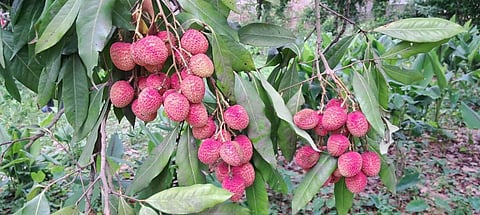

An unexpectedly long spell of heatwave in Bihar in June has affected the appearance and taste of summer fruits like litchis and mangoes. Litchi- and mango-growing farmers said the quality and yield of the fruits are affected due to the rising temperatures during the harvest season.
At least 10 stations in the state saw temperatures of over 44 degrees Celsius on June 8, 2023. The India Meorological Department has issued a heatwave alert for June 9-10 for nine districts in the state.
Thousands of farmers in the state have been forced to irrigate their orchards daily and spray water on trees loaded with litchi twice a day to reduce the impact of scorching sun and hot winds. But small farmers are finding it difficult to hire water tanks to save their produce.
“Scorching sun and heatwave conditions are badly damaging litchi crops, which is not good for farmers as well as traders. Farmers have been trying to protect litchi crops by increasing irrigation and water spraying, the only option known to us,” Bhola Nath Jha, a litchi farmer, told this reporter.
Heatwave conditions first affected Shahi litchi, a unique variety from Muzaffarpur, in the last week of May and early June, said Jha. But rising temperatures have been damaging China, another popular variety of litchi, too.
“Several farmers have opted for an early harvest of their crops because they were afraid of big losses due to unfavourable climatic conditions”.
The National Research Centre on Litchi (NRCL) in Muzaffarpur has advised farmers to irrigate orchards to provide moisture in view of rising temperatures. “High temperatures, along with hot winds, are bad for litchi. This not only affects litchi’s quality but reduces yields as well,” said Bikash Das, director of NRCL.
A favourable climate plays a major role in producing good-quality litchi, said SD Pandey, former director of NRCL. “Due to rising temperatures and heatwave conditions, litchi’s skin or peel is scorching and cracking. It is a loss to growers because the size, taste and quality of the fruit are bound to be affected,” he said.
Spraying water is the best option, but it is a difficult and challenging task to protect litchi ahead of harvesting, Pandey said. Orchards often have thousands of trees spread over hundreds of acres.
“Heatwave conditions, hot winds and rising temperatures are results of climate change. Never before were temperatures recorded close to 41 to 42 degrees Celsius in Muzaffarpur and neighbouring districts. Changing modes of action to harvest healthy litchi points to an urgent situation,” he said.
Farmers had expected a bumper harvest this year, said Bachcha Singh, a litchi farmer and president of the Litchi Utpadak Sangh. “The same farmers are struggling to protect litchi from extreme heat.”